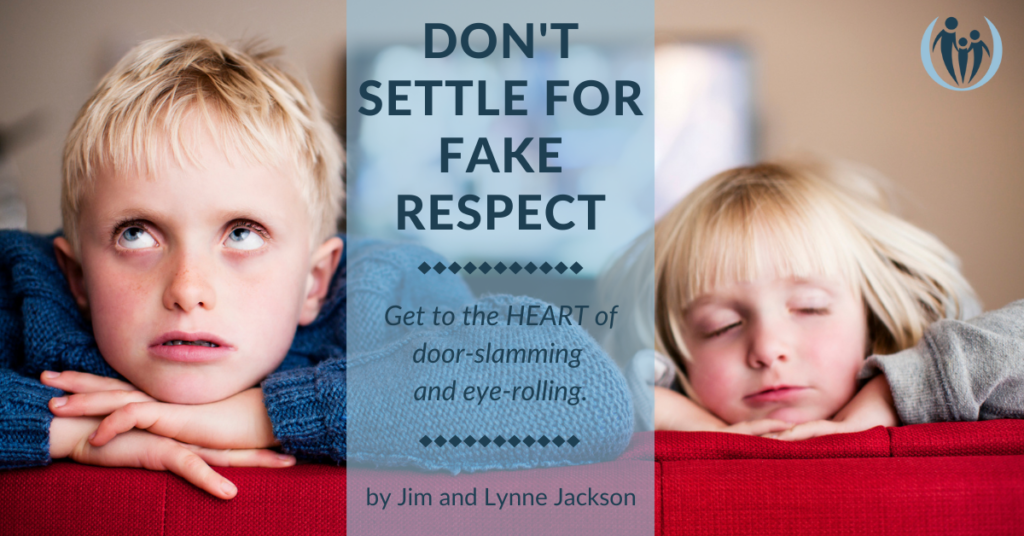
Don’t Settle for Fake Respect

Look, you don’t set out to teach your child fake respect. Obviously, not. But the pressures of parenting are high. You’ve got a lot to do, and sometimes you respond in the quickest, most efficient way.
Maybe that looks like…
- “Don’t talk to me that way!”
- “I saw you roll your eyes!”
- “I don’t like your attitude, young lady!”
- “Don’t look at me that way!”
- “No door slamming!”
Sound familiar?
Why teaching fake respect is so easy
Kids know your buttons. For most parents, one of the most frustrating buttons a child can push is a blatant display of disrespect.
You’ve probably seen it. This list might be the list of nightmares to some parents:
- Sass (“Yeah, whatever…”)
- Eye-rolling
- Door-slamming
- Exaggerated sighs of disdain
- Dismissive shrugs
This list of blatant disrespect is not pleasant to read. When you encounter this kind of behavior, it’s tempting to focus on regaining control over your disrespectful child. You may want nothing more than to shout out, “That kind of disrespect is NOT OK!”
You can demand your child’s respect. But does that help you understand what is going on in their heart?
All you are requiring them to do is change their outer appearance of respect. Hence fake respect.
You can demand your child’s respect. But does that help you understand what is going on in her heart?
What Jesus focused on
Jesus held people accountable, but his focus was always on the heart. Interestingly, his chief opponents, the Pharisees, looked pious on the outside while holding conniving, evil intentions. They appeared to revere God, but internally they were corrupt. Jesus called them white-washed tombs and quoted the prophet, Isaiah, “These people honor me with their lips, but their hearts are far from me.” (Mark 7:6)
Jesus pointed out time and again that the condition of the heart was the essential issue, not correct outward behavior. “Blessed are the pure in heart, for they will see God.” (Matthew 5:8)
There is no Biblical example of Jesus demanding others to respect him or to quit their sass. In fact, in many examples, Jesus was simply silent.
So if Jesus focused on the heart, instead of outward displays, how can you cultivate a respectful heart in your child?
Fake respect grows from forced outward respect
Despite this, parents often believe, “If I can eliminate my child’s outward expression of disrespect, I’ve gotten my child to be respectful.” Nothing could be further from the truth!
It’s like saying, “If I slap some paint on the outside of this run-down house, the dead stuff that continues to rot inside won’t stink.”
When you “successfully” shut down a child’s disrespect, what often festers and “rots” inside is silent contempt. The more a child knows they have the power to push their parent’s buttons, the more insecure and small their parent seems in their eyes.
Your child may respond to a demand for respect with a tight-lipped, “Yes, ma’am.” A second later, they text their friends, “My parents are so annoying!”
The appearance of respect is on the outside, but it’s fake respect. No true respect is growing in your child’s heart.
When the focus is on managing the outward display of disrespect, heart-level disrespect grows. Moreover, especially with strong-willed kids, so does the resistance… often through craftier means.

Managing disrespect simply becomes a game of power. It’s like playing the arcade game, Whack-a-Mole. Wham, and another sassy response pops up, faster and faster. The older kids get, the more powerful they feel in this game.
Change starts with looking inward first
If you’re looking to grow a culture of heartfelt respect in your home, start by asking yourself these questions:
- What is really going on here?
- What’s going on in me about this?
- Have I taken the easy road of intimidation, instead of the longer, harder road of mutually respectful conflict resolution?
- Am I preoccupied with how I feel when my buttons get pushed and don’t really care why my child might be pushing buttons?
- Do I know (and care about) what else might be discouraging my child that is coming out sideways?
Day-to-day training in heartfelt respect
The heat of the moment is the best time for parents to build true respect in their relationship with their child. Let’s make that practical for two typical “button-pushing” behaviors – door-slamming and eye-rolling.
Door Slamming
One dad was heard saying to another, “I nipped my daughter’s door-slamming in the bud… I simply took the door off its hinges for a while. That sure taught her a lesson!”
“Ha, what a great idea!” responded the other dad.
There was a condescending, “winner-loser” attitude in the conversation that made me cringe. It might seem like quite an effective consequence to remove a slammed door from the hinges. Clever, yes. Constructive, no.
The message this man sent to his daughter was: “What I care about is stopping your outward display of disrespect so I feel back in control. I don’t give a rip about what you were upset about.”
As the gaping doorway denied her privacy in a vulnerable moment, I wonder if she closed the door of her heart instead. If so, there were no “winners” in this confrontation.
Instead, what would have happened if the father had remained genuinely curious about what was going on in his daughter’s heart?
Perhaps, in your family, you might say something like, “I’d like to understand the real message beneath the door-slamming. We are too upset to talk about it now, but before the end of the day, I’d like you to either tell me or write out a few clear, respectful sentences so I can understand. I think that will help both of us.”
Eye Rolling
Shelly, a coaching client, initially panicked when her twelve-year-old daughter Jenna first began eye-rolling. She texted me (Lynne), “What should I do?! This is new territory for me. Is this what the teen years will be like?”
I suggested she gently ask, “If those eyes could talk, what would they be saying to me right now? I really do care and want to know.”
When Shelly responded this way to the next eye roll, Jenna (prone to silence) simply walked off. But the behavior never gained power and soon disappeared.
Looking back, Shelly realized that Jenna had been going through a hard time after a big disappointment. She just needed to feel truly cared about. Shelly earned her daughter’s true respect by her understanding response.
Empower true respect in your kids’ hearts
The good news about a disrespectful child is that the more blatant and aggravating your child’s expression of disrespect, the less hidden contempt you need to worry about.
Now you get to empower your child to respond with true respect. This will only happen if you respond with grace as you work together on the issue under the disrespect.
Reflect on what real respect means
To teach your kids respect, you need a goal. Your kids will sometimes be upset and need to be able to tell you this. Your goal has to include that need. Ask yourself these questions:
- How do you want your kids to respectfully express their upset feelings?
- How can you help them begin to learn those skills?
When your child breaks out in their next round of blatantly disrespectful words or actions, take a deep breath. Then look under the surface and invite your child to express how they’re feeling in a constructive manner.
This is an opportunity to grow a culture of true, heartfelt respect and reconciliation in your home!
Want to explore this idea further? Listen to this podcast where we discuss in depth the idea of teaching kids to be responsible for their actions.
Ready to dive in and learn more about the Framework?
Our 8-session online course, Discipline That Connects With Your Child’s Heart will guide you through each level of the Framework. If you’re looking for a grace-filled way to parent, this course is for you!





